Natori by Josie Natori (2009) - Sensual Yet Pointing To No Visible Body Parts {Perfume Review}
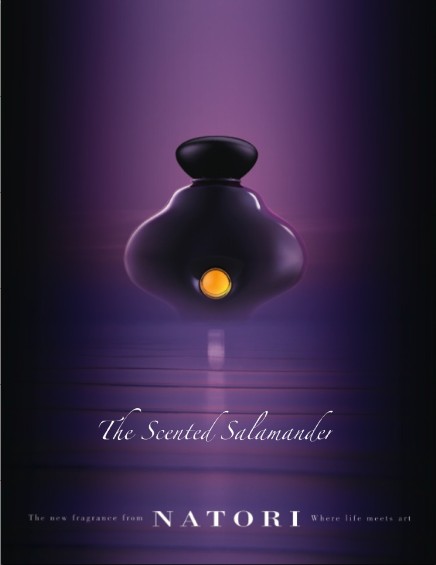
Natori by Josie Natori
The perfume starts with a subtle, surface powdery impression soon followed by a beautiful both intense and understated aldehydic white floral bouquet like a cleaner but no less feminine Joy by Patou. It is a Joy Americanized, made easier to wrap your mind around, offering the clarity of lines of a beautiful race automobile.
The impression of Joy came to me before I went to check some background information about the scent. Josie Natori said that growing up she was used to reveling in rich perfumes: Joy by Patou that her grand-mother wore, as well as Bal à Versailles by Jean Desprez, both which can be described as old-school French perfumes.
This is just the introduction as it turns out. While you were checking the box next to the word "linear" in your mind as one more sign of Americanization in the jus, the fragrance starts to slowly fade into a deeper, darker and fruitier atmosphere reminiscent of the oriental base with myrrh in Gianni Versace (1981) which has aldehydic, fruity, and chypre facets as well...
The aldehydic facet gains in power, which retrospectively makes you realize better why the composition made you think of an elegant race car. Aldehydes have something glaring about them, like the reflection of a noon sun on the main metal body of a car. Since Chanel No5 and its overdose of aldehydes, they can be used to signal the hard and fast modern age, a woman driving an automobile when it became a sign of emancipation. Looking back at the bottle, which is beautiful - an abstract lotus form in glass that has the feel of ceramic glazed with metal - you feel that this aldehydic facet is well-evoked by the cold and warm sheen of the flacon. Purple was chosen as a tint meant to contain and harmonize both the coolness of blue (Yin) and the warmth of red (Yang). The particularly striking design is signed by Dale Kan of Brandology. I see a little wink in the direction of the bottle of Opium with this ajouré opening in the flacon.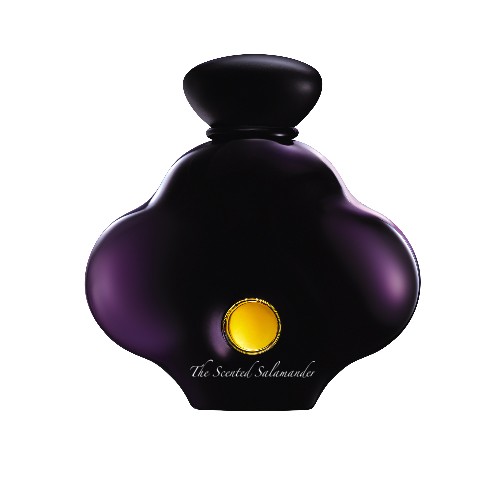 A stage later, the perfume now lets out a subtle incensey note mingling with attenuated fruity notes. The aldehydes have calmed down. The scent is sweetly abstract and delicate, like a feathery, transparent Chinese scroll painting of apricots and prunes. A faint echo of oakmoss is perceptible. The drydown later will reveal a pastel note of patchouli, very timidly earthy and suave.
A stage later, the perfume now lets out a subtle incensey note mingling with attenuated fruity notes. The aldehydes have calmed down. The scent is sweetly abstract and delicate, like a feathery, transparent Chinese scroll painting of apricots and prunes. A faint echo of oakmoss is perceptible. The drydown later will reveal a pastel note of patchouli, very timidly earthy and suave.
The composition evolves further still. Now it has become jammier, reminding me of fig jam but always retaining an allusive and indirect character rather than frankly and openly painting the fleshes of luscious figs and dates. The powdery character now recurs but as if sifted through a muslin rather than evoking straightforwardly a retro box of face powder. There is a discreetly dissonant green note which adds interest to the blend and makes me think again, conceptually only, of my jar of Lebanese fig jam mixed with green anise.
Natori is visibly a carefully crafted perfume with a quite remarkable sense of subtle phasing. Its creation was entrusted to Caroline Sabas of Givaudan who had to perfect a perfume formula originally elaborated in the 1980s. It is a pleasure to rediscover some subtlety and sense of pride in perfume craftsmanship when smelling this fragrance. The hiatus the perfume development went on visibly benefited it adding that extra necessary ingredient, time, probably the rarest of the perfume ingredients nowadays.
Josie Natori could have taken an easier route such as requiring two things out of a scent meant to embody a lingerie brand: that it be talc-y and sexy (I am thinking of the nice cuddly-sexy Chantal Thomass's perfume Osez-Moi! which is more culpable of this lighter approach while being absolutely enjoyable as it is). Natori is a more complex proposition. 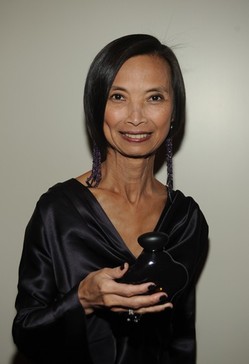 You will also have to discard the "celebrity perfume" lens to evaluate it as the jus (juice) stands on its own two feet or rather silken, floral legs. If you want to smell a perfume that is constructed following perfumery constraints rather than overarching external criteria such as a person's favorite notes, trends, etc. (and please make that work), this is a good example of it. It is not to say that Natori's tastes were not taken into account: she detests citruses and sweet notes and the scent is inspired in part by her memories of the smells of jasmine and peonies growing by a river in the Philippines.
You will also have to discard the "celebrity perfume" lens to evaluate it as the jus (juice) stands on its own two feet or rather silken, floral legs. If you want to smell a perfume that is constructed following perfumery constraints rather than overarching external criteria such as a person's favorite notes, trends, etc. (and please make that work), this is a good example of it. It is not to say that Natori's tastes were not taken into account: she detests citruses and sweet notes and the scent is inspired in part by her memories of the smells of jasmine and peonies growing by a river in the Philippines.
There is a sense of subtle academism to this perfume that is winning for me. The fragrance is tradition-bound, indebted to the history of perfume, yes, rather than looking toward the future,yes again, but it does so with a real perfumer's mind in which the qualities of subtlety, sensitivity and patience are palpable.
In the end, I am reminded that in Natori, just like in Chanel No.5 there exists a paradox: the coexistence of the idea of a life lived more quickly, urgently, a thirst for modernity and change, and a sense of patience, thoughtfulness, and homage to the past without which the craft and art of perfume is meaningless, it seems. Perfume has a conservative streak in itself due to it being tied so much to the past and our former loves and dislikes, yet it can be modern and create novel atmospheres.
It may be more difficult for perfumery than for any other arts to be creative but at the same time it can be so in very incremental, subtle ways. If visually, we may be most attracted to intensity, olfactorily, the cultivated nose will be always ready to discern and enjoy nearly-impalpable nuances. In those timid steps lies much potential, and when a composition such as Natori plays with our natural appreciation of olfactive fading ins and outs, one feels that this is what the language of perfumery is quintessentially about or capable of at least: subtlety, abstraction, nuance, timing; there are not enough perfumes that play with the sense of time.
The drydown of Natori could be more complex and longer-lasting, but as it is, the perfume makes already so many more efforts than other perfumes born in 2009 that it hard to begrudge it for its somewhat low-key sense of exit.
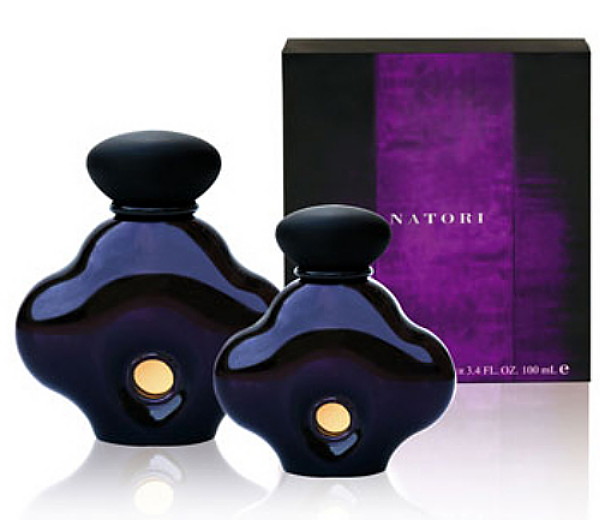 If you are looking for a cleaner and less dramatic version of old-school French perfumes, this is perfect. I have had fun in the past trying to define the stinky Gallic perfume for Strip and Stephen Jones). If the former is aiming for the scent of live feminine drawers, Natori can be said to be more about taking a step back from the whole sexy mess and being an abstract lingerie perfume, sensual yet pointing to no visible body parts. The perfume is feminine and complex while seemingly taking into account the fact that you might want to wear it to work without making your co-workers feel like they have set up their desks in your boudoir, or potentially worse, have been beamed up into a red-lights bordello zone. Billed as an aldehydic floral-oriental, Natori also has discreet powdery, fruity and even more tenuous yet present earthy and green nuances. If you are tired (for a while only of course) of figurative perfumes where the link from smell to real world object is all too obvious, this is also a good bet as it prefers to be called abstractly "perfume" and you would be hard-pressed to say what it smells like except quite a bit like Joy, Chanel No5 (intellectually), Gianni Versace (an idea or two) and Germaine Monteil Royal Secret II (its Mejdool dates, rose, powder but in more pastel shades).
If you are looking for a cleaner and less dramatic version of old-school French perfumes, this is perfect. I have had fun in the past trying to define the stinky Gallic perfume for Strip and Stephen Jones). If the former is aiming for the scent of live feminine drawers, Natori can be said to be more about taking a step back from the whole sexy mess and being an abstract lingerie perfume, sensual yet pointing to no visible body parts. The perfume is feminine and complex while seemingly taking into account the fact that you might want to wear it to work without making your co-workers feel like they have set up their desks in your boudoir, or potentially worse, have been beamed up into a red-lights bordello zone. Billed as an aldehydic floral-oriental, Natori also has discreet powdery, fruity and even more tenuous yet present earthy and green nuances. If you are tired (for a while only of course) of figurative perfumes where the link from smell to real world object is all too obvious, this is also a good bet as it prefers to be called abstractly "perfume" and you would be hard-pressed to say what it smells like except quite a bit like Joy, Chanel No5 (intellectually), Gianni Versace (an idea or two) and Germaine Monteil Royal Secret II (its Mejdool dates, rose, powder but in more pastel shades).
Notes: sparkling aldehydes, rose petals, dark plum/ ylang-ylang, purple peony, night blooming jasmine/ balck patchouli, mysterious amber, satin musk accord.
The Eau de Parfum is available for $110 and $80 at www.natori.com









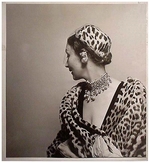
What a lovely review.
I, too think that this scent cannot be so easily dismissed.
Another delightful surprise, was the woman herself; incredibly warm, genuine, and without the slightest conceit or pretense.
For someone with such a long list of artistic credits, it is even more unusual !
The body cream stands on its own, as well.
Thank you for your kind words
I do not know Josie Natori the person but I'm glad to hear that she comes across as a nice personality. Mmm, it seems to me pretentiousness would have more to do do with lack of achievement than the reverse, so I am not surprised that someone with many artistic achievements is not pretentious (but I have to say that I don't know her bio)
Thank you for the info about the body cream. The whole line is beautifully packaged
You've inspired me to add Josie Natori's picture in the post
This bottle looks very similar of the bottle "Bleu de Chine of Marc de la Morandiere.